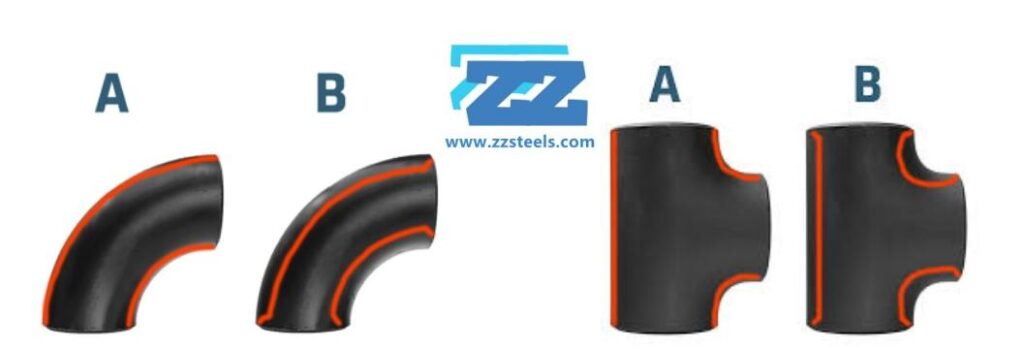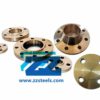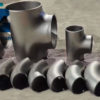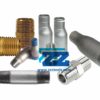EN 10253-2 Butt weld fittings standard is one of the standards developed by the European Committee for Standardization (CEN). It specifies the dimensions, materials and other relevant requirements for seamless and welded steel pipes and fittings, especially for seamless and welded steel pipes and fittings used for pressure applications.
EN 10253-2 butt weld fittings are widely used in various industrial fields, especially those that require the use of pressure piping systems, such as chemical, oil and gas, power, pharmaceutical and other industries. In these industries, the quality and reliability of butt weld fittings are crucial because they are directly related to the safety and performance of the entire piping system. Following the requirements of the EN 10253-2 standard can ensure that the quality and performance of the pipe fittings meet the requirements, thereby improving the safety and reliability of the piping system and reducing the occurrence of accidents and failures.
What material is EN 10253-2?
EN 10253-2 is the standard specification for butt welding pipe fittings of non-alloy and ferritic alloy steels with specific inspection requirements. Typical materials include P235GH, P265GH, 16Mo3, 13CrMo4-5, P355NH, and L450QB, etc.
Examples of Common Steel Grades
P265GH in EN 10253-2: The yield strength is slightly higher than that of P235GH, about 265MPa, and the comprehensive mechanical properties are slightly better. It can be used in working conditions with slightly higher pressure and temperature, such as EN 10253-2 Butt Weld Fittings for gas pipelines with slightly higher pressure in some chemical plants.
13CrMo4-5 in EN 10216-2: The addition of chromium (Cr) elements can improve the oxidation resistance and corrosion resistance of steel, and molybdenum (Mo) elements can improve the high temperature strength and creep resistance of steel. This material is often used in high temperature, high pressure and certain corrosion risk pipeline systems.
What is the difference between welded and seamless pipe fittings?
Appearance and Size
Seamless pipe fittings: The pipe wall is smooth in appearance, and there are no obvious traces of welds. Due to the limitations of the manufacturing process, its size specifications are relatively limited, especially for large-diameter seamless pipe fittings, which are difficult to produce and costly.
Welded pipe fittings: Obvious welds can be seen on the surface. Welded pipe fittings have greater flexibility in size and can manufacture pipe fittings of various complex shapes and large diameters.
Corrosion Resistance
Seamless pipe fittings: Since there are no welds, their corrosion resistance is relatively uniform. Under the same corrosive environment, the corrosion resistance of seamless pipe fittings is relatively stable.
Welded pipe fittings: The chemical composition and organizational structure at the weld are different from those of the parent material, and it is easy to form micro-batteries of electrochemical corrosion, resulting in the corrosion rate at the weld being higher than that of the parent material. Therefore, welded pipe fittings are relatively weak in corrosion resistance, especially in a strong corrosive environment.
EN 10253-2 Butt Weld Fittings Specification
| EN 10253 Elbow Specification | EN 10253/2 Type A |
| EN 10253/2 Type B | |
| Sizes | DN15-DN1200 |
| EN 10253-2 Grades | EN / DIN P235GHTC1/2 (St 35.8 I/ III), P265GH, 16Mo3 (15Mo3), 10CrMo9-10 (10CrMo910), 13CrMo4-5 (13CrMo44) X11CrMo5, X11CrMo9-1,X10CrMoVNb9-1, P215NL (TTST35N/V), 12Ni14 (10Ni14) P355N (StE355), P355NH (WStE355), P355NL1 (TStE355), P355NL2 L290NB (STE 290.7), L360NB (STE 360.7) |
| process | Hot forming, Push, Press, Forge, Cast, etc. |
EN 10253-2 Standard Scope
This Part of EN 10253 specifies the technical delivery requirements for seamless and welded butt-welding fittings (elbows, concentric and eccentric reducers, equal and reducing tees, caps) made of carbon and alloy steel which are intended for pressure purposes at room temperature, at low temperature or at elevated temperatures, and for the transmission and distribution of fluids and gases.
Terms and Definitions
For the purposes of this document, the relevant definitions in EN 10020:2000, EN 10021:2006, EN 10052:1993 and EN ISO 377:1997 apply, except as defined below.
carbon steel grade
in this part of EN 10253, the following grades :
P235TR2 – P265TR2 – P235GH – P265GH – P355N – P355NH – P355NL1 – P215NL – P265NL
Mandatory Information
The following information shall be supplied by the purchaser at the time of enquiry and order:
a) quantity required (number of pieces)
b) reference to this European Standard
c) type of fitting, A or B
d) designation of fittings (see 5.2) and the wall thickness T(T1 )
e) designation of the steel grade (see 5.1)
Chemical Composition of EN 10253-2 Butt Weld Fittings
| Table 4 — Chemical composition (cast analysis). in % by mass a | ||||||||||||||
| Steel name | Steel number |
C | Si | Mn | P | S | Al tot | Cr | Cu | Mo | Nb | Ni | Ti | V |
| P235TR2 | 1.0255 | 0.16 | 0.35 | 120 | 0.025 | 0.020 | ≥ 0.020 c | 0.30 b | 0.30 b | 0.08 b | 0.01 b | 0.30 b | 0.04 b | 0.02 b |
| P265TR2 | 1.0259 | 0.20 | 0.40 | 140 | 0.025 | 0.020 | ≥ 0.020 c | 0.30 b | 0.30 b | 0.08 b | 0.01 b | 0.30 b | 0.04 b | 0.02 b |
| P235GH | 1.0345 | 0.16 | 0.35 | 120 | 0.025 | 0.020 | ≥ 0.020 c | 0.30 | 0.30 | 0.08 | 0.01 b | 0.30 | 0.04 b | 0.02 b |
| P265GH | 1.0425 | 0.20 | 0.40 | 140 | 0.025 | 0.020 | ≥ 0.020 c | 0.30 | 0.30 | 0.08 | 0.01 b | 0.30 | 0.04 b | 0.02 b |
| 16Mo3 | 1.5415 | 0.12-0.20 d | 0.35 | 0.40-0.90 | 0.025 | 0.020 | ≤ 0.040 | 0.30 | 0.30 | 0.25-0.35 | – | 0.30 | – | – |
| 10CrMo5-5 | 1.7338 | 0.15 | 0.50-1.00 | 0.30-0.60 | 0.025 | 0.020 | ≤ 0.040 | 1.00-1.50 | 0.30 | 0.45-0.65 | – | 0.30 | – | – |
| 13CrMo4-5 | 1.7335 | 0.10-0.17 d | 0.35 | 0.40-0.70 | 0.025 | 0.020 | ≤ 0.040 | 0.70-1.15 | 0.30 | 0.40-0.60 | – | 0.30 | – | – |
Mechanical Property of EN 10253-2 Butt Weld Fittings
| Table 6 — Mechanical properties | ||||||||||
| Steel grade | Upper yield strength or proof strength ReH or Rp0,2 min. for wall thicknesses T in mm N/mm2 |
Tensile strength Rm for wall thicknesses T in mm N/mm2 |
Elongation A min. % |
|||||||
| Name | Number | T ≤ 16 | 16 < T ≤ 40 | 40 < T ≤ 60 | 60 < T ≤ 100 | T ≤ 16 | 16 < T ≤ 60 | 60 < T ≤ 100 | Longitudinal | Transverse |
| P235TR2 | 1.0255 | 235 | 225 | 215 | – | 360-500 | 360-500 | – | 25 | 23 |
| P265TR2 | 1.0259 | 265 | 255 | 245 | – | 410-570 | 410-570 | – | 21 | 19 |
| P235GH | 1.0345 | 235 | 225 | 215 | – | 360-500 | 360-500 | – | 25 | 23 |
| P265GH | 1.0425 | 265 | 255 | 245 | – | 410-570 | 410-570 | – | 23 | 21 |
| 16Mo3 | 1.5415 | 280 | 270 | 260 | – | 450-600 | 450-600 | – | 22 | 20 |
| 10CrMo5-5 | 1.7338 | 275 | 275 | 265 | – | 410-560 | 410-560 | – | 22 | 20 |
| 13CrMo4-5 | 1.7335 | 290 | 290 | 280 | – | 440-590 | 440-590 | – | 22 | 20 |
What is the difference between EN10253-1 and EN10253-2?
EN 10253-1 is the standard specification for butt welding fittings of wrought carbon steel. For general use and without specific requirements. Generally the material may be S235 or its alternative S265.
EN 10253-2 is the standard specification for butt welding pipe fittings of non-alloy and ferritic alloy steels. With specific inspection requirements. EN 10253-2 Butt Weld Fittings Typical materials include P235GH, P265GH, 16Mo3, 13CrMo4-5, P355NH, and L450QB, etc.
What is the difference between type A and type B fittings?
Type A : Butt-welding fittings with reduced pressure factor
Type B : Butt-welding fittings for use at full service pressure
Fittings of type A
Type A fitting have the same wall thickness at the welding ends and at the body of the fitting than a pipe having the same specified wall thickness. Their resistance to internal pressure is less than that of a pipe with the same specified diameter, wall thickness and of the same steel grade. The determination of the reducing pressure factor is given in Annex A and tables of pressure factors are given in Annex B.
For reducers the wall thickness at the conical section shall be the specified wall thickness at the major end.
Fittings of type B
Fittings of type B have increased wall thickness at the body of the fitting. They will, in general, withstand the same pressure than a pipe having the same specified diameter, wall thickness and the same steel grade.
Wall thickness requirements for this type of fittings are defined by the calculation procedures given in Annex A. For some preferred, specified wall thicknesses the resulting wall thicknesses at the body of the fitting are listed in the tables given in Annex C.

EN 10253-2 Butt Weld Fittings Dimension Tolerance
Tolerances for ovality are following:
At the welding ends:
D ≤ 273,0 Included in the diameter tolerance ;
273,0 < D ≤ 610 2 % ;
D > 610 1 % ;
On the body for elbows and return bends : 4 %.
The ovality shall be calculated as follows :
Ov = 100 (Dmax -Dmin) / D in %
Where:
Dmax is the bigger diameter in one section, expressed in millimetres ;
Dmin is the smaller diameter in the same section, expressed in millimetres ;
D is the specified diameter, expressed in millimetres.
Wall thickness tolerances are indicated in Table 1. For fittings type B, the minus tolerances on T apply also for the other values of the wall thickness as defined in Annex A.
| Table 1 — Wall thickness tolerances at the welding ends | |||
| D mm |
T mm |
Wall thickness tolerance | |
| Minus | Plus | ||
| ≤ 610 | ≤ 4
> 4 |
– 12,5 % | + 20 % |
| > 610 | Seamless | – 12,5 % | + 20 % |
| Welded ≤ 10 > 10 |
– 0,35 mm – 0,5 mm |
+ 20 % | |
For the dimensions specific to fittings, the tolerances are given in Table 2
| Table 2 — Tolerances on specific dimensions and form | |||||
| Dimensions in millimetres | |||||
| D | F-G-L-W | B-Z | C | h | P |
| ≤ 114,3 | ± 2 | ± 7 | ± 7 | ± 4 | 2 |
| 114,3 < D ≤ 219,1 | ± 2 | ± 7 | ± 7 | ± 7 | 4 |
| 219,1 < D ≤ 406,4 | ± 3 | ± 7 | ± 10 | ± 7 | 6 |
| 406,4 < D ≤ 762 | ± 3 | ± 10 | ± 10 | ± 7 | 7 |
| 762 < D | ± 5 | ± 12 | ± 10 | ± 10 | 9 |
Who Should Use EN 10253-2 Standard?
The EN 10253-2 standard is designed for a broad audience, including:
Engineers and Designers: Ensure that your designs comply with the latest standards and best practices.
Manufacturers: Maintain high-quality production standards and meet industry requirements.
Inspectors and Quality Control Professionals: Conduct thorough inspections and ensure compliance with specific requirements.
Procurement Specialists: Source materials and products that meet recognized standards.
Application field
● Energy industry
● Oil and natural gas
● Chemical industry
● Various chemical plants
● Buildings and infrastructure
● Building water supply and drainage systems
● Urban heating and gas supply
● Machinery manufacturing and industrial production
● Factory internal piping systems
● Large-scale machinery and equipment
You can get an offer for products in below material forms:
– Pipe and Tube (EN 10216-5, ASTM A213, ASTM A249, A312, A790,)
– Forged Fitting and Flange (ASTM A182 , ASTM A105,ASTM B564 )
– Butt Weld Fittings (ASTM A234, ASTM A403,ASTM A815)
– Round bar , Billet (ASTM A276, ASTM A479)
– Plate, Sheet, Strip(ASTM A240, EN 10028-7, A480)
– Bolting, Nuts(ASTM A193, A194, A320)
EN 10253-2 Butt Weld Fittings Exported Countries
We Export EN 10253-2 Butt Weld Fittings to Saudi Arabia, United Arab Emirates, Qatar, Bahrain, Oman, Kuwait, Turkey, Egypt, Yemen , Syria, Jordan, Cyprus, Singapore, Malaysia, Indonesia, Thailand, Vietnam, South Korea, Japan, Sri Lanka, Maldives, Bangladesh, Cambodia, Argentina, Bolivia, Brazil, Venezuela, Colombia, Ecuador, Guyana, Paraguay, Uruguay, United States Of America, Canada, Mexico, Panama, Jamaica, Bahamas, Denmark, Norway, Germany, France,Italy, United Kingdom, Spain, Belgium, Greece, Czech Republic, Portugal, Hungary, Albania, Austria, Finland, Ireland, Croatia, Malta, Nigeria, Algeria, Angola, South Africa, Libya, Egypt, Sudan, Europe, Africa, Asia, North America, South America, Middle East.etc
Latest News
 02 8 月 2019Copper Nickel Flanges UNS C70600Zizi offers ISO certified copper nickel flanges, stores large quantity of Cu-Ni 90/10 weld neck flan...
02 8 月 2019Copper Nickel Flanges UNS C70600Zizi offers ISO certified copper nickel flanges, stores large quantity of Cu-Ni 90/10 weld neck flan...  29 7 月 2019Stainless Steel Buttweld Fittings ManufacturerZizi is stainless steel buttweld fittings manufacturer, we offer stainless steel pipe elbow, tee, ca...
29 7 月 2019Stainless Steel Buttweld Fittings ManufacturerZizi is stainless steel buttweld fittings manufacturer, we offer stainless steel pipe elbow, tee, ca...  19 7 月 2019Steel Pipe Nipple Types, Dimensions and MaterialsBasic pattern of steel pipe nipple is a short piece of pipe with threads at both end or at one end....
19 7 月 2019Steel Pipe Nipple Types, Dimensions and MaterialsBasic pattern of steel pipe nipple is a short piece of pipe with threads at both end or at one end....
